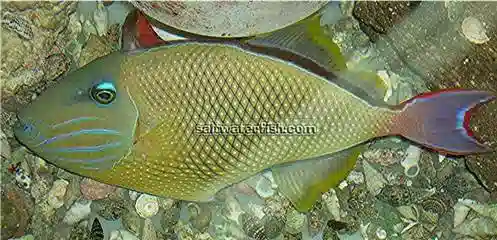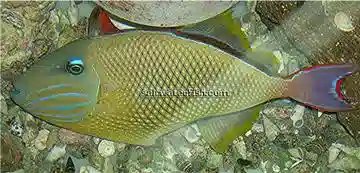Crosshatch Trigger: Male
Xanthichthys mento
(1 Reviews)

Crosshatch Trigger: Male
Xanthichthys mento
(1 Reviews)
{{ item.name }}
Size: {{ item.extra_field_3 }}
${{ getFormattedPrice(item.saleprice) }} ${{ getFormattedPrice(item.price) }}
To join the waiting list, click here
Free Shipping
With
$199.00
or more in Marine Life.
More details...
Crosshatch Trigger: Male Care Facts
| Care Level: | Easy |
|---|---|
| Temperament: | Semi-Aggressive |
| Diet: | Carnivore |
| Reef Safe: | No |
| Minimum Tank Size: | 125 Gallons |
| Max Size: | 9 inches |
Keeping the Crosshatch Triggerfish (Xanthichthys mento) in Your Saltwater Aquarium
The Crosshatch Triggerfish (Xanthichthys mento) is an intriguing and captivating choice for your saltwater aquarium. In this informative product description, we'll provide essential information for experienced hobbyists and those considering the Crosshatch Triggerfish for their marine tank. We'll cover crucial aspects such as the fish's habitat, reef compatibility, size, lifespan, dietary requirements in captivity, aquaculture availability, compatibility with other marine species, sexual dimorphism, coloration changes from juvenile to adult, temperament, tank requirements, and optimal water conditions. Additionally, we will list common names for this species, suggest suitable tankmates, and explain why purchasing the Crosshatch Triggerfish from Saltwaterfish.com is an intelligent choice.
Habitat of the Crosshatch Triggerfish
The Crosshatch Triggerfish naturally inhabits the Indo-Pacific region, where it prefers rocky substrates, coral reefs, and areas with ample hiding spots. To ensure the fish's well-being in captivity, it's vital to recreate a similar environment within your aquarium.
Reef Compatibility of the Crosshatch Triggerfish
The Crosshatch Triggerfish is not typically considered reef-safe due to its innate foraging behavior. These fish may disturb corals and invertebrates, making them better suited for fish-only or fish-only-with-live-rock (FOWLR) setups.
Size and Lifespan of the Crosshatch Triggerfish
Crosshatch Triggerfish can reach a maximum length of about 10 inches (25 cm) in captivity. They can have a relatively long lifespan with proper care, typically ranging from 8 to 12 years.
Diet of the Crosshatch Triggerfish in Captivity
Crosshatch Triggerfish are omnivorous, and their diet should include a variety of high-quality marine pellets, frozen foods, and live or frozen seafood to maintain their health and vibrancy.
Aquaculture and Availability of the Crosshatch Triggerfish
While not commonly aquacultured, Crosshatch Triggerfish are often available to hobbyists through reputable suppliers and online retailers like Saltwaterfish.com.
Compatibility with Other Fish and Invertebrates
Crosshatch Triggerfish can exhibit territorial and occasionally aggressive behavior, particularly when they feel threatened or are establishing their territory. Therefore, it is essential to select compatible tankmates to minimize potential conflicts. Suitable tankmates may include large angelfish, tang species, wrasses, and other robust marine species.
Sexual Dimorphism of the Crosshatch Triggerfish
Crosshatch Triggerfish display significant sexual dimorphism, the coloration of the male vs female are distinctly different.
Coloration Changes from Juvenile to Adult in Crosshatch Triggerfish
Juvenile Crosshatch Triggerfish often showcase vibrant colors with striking patterns. As they mature into adults, their coloration becomes more subdued, with fewer patterns and a more solid appearance.
Temperament of the Crosshatch Triggerfish
The Crosshatch Triggerfish is known for its territorial nature, and it can display aggression, particularly when other fish encroach on its territory. Providing ample hiding spots and territories within the aquarium can help mitigate this behavior and create a more balanced environment.
Tank Requirements for the Crosshatch Triggerfish
To ensure the well-being of your Crosshatch Triggerfish, you will need an aquarium with a minimum capacity of 125 gallons (480 liters). These fish require ample swimming space, hiding spots, and the freedom to establish territories.
Water Conditions for the Crosshatch Triggerfish
Maintaining stable water conditions is vital for the health of your Crosshatch Triggerfish. The following are the recommended water parameters:
- pH: 8.1 to 8.4
- Salinity: 1.020 to 1.025
- Water Temperature: 76 to 82°F (24 to 28°C)
- Water Flow: Moderate to strong, simulating the natural current of their native habitat.
Common Names of the Crosshatch Triggerfish
The Crosshatch Triggerfish is also known by various common names, including the Blue Line Triggerfish and the Crisscross Triggerfish.
Five Compatible Tank Mates
- Emperor Angelfish (Pomacanthus imperator): These stunning angelfish are ideal for larger tanks and can coexist with Crosshatch Triggerfish.
- Yellow Tang (Zebrasoma flavescens): Peaceful herbivores that add diversity and color to your aquarium.
- Flame Angelfish (Centropyge loricula): Compatible angelfish that add vibrancy to your tank.
- Hawaiian Cleaner Wrasse (Labroides phthirophagus): These cleaner wrasses help control pests and contribute to the tank's overall well-being.
- Sohal Tang (Acanthurus sohal): A striking tang species that complements the Crosshatch Triggerfish in larger aquariums.
Why Choose the Crosshatch Triggerfish from Saltwaterfish.com
Saltwaterfish.com is a reputable source for obtaining marine fish and invertebrates for your aquarium. They are known for their stringent care and quarantine practices, ensuring that the fish they provide are healthy and free from diseases. When you purchase a Crosshatch Triggerfish from Saltwaterfish.com, you can have confidence in the quality of your new marine addition, knowing that it will thrive in your aquarium.
Very lovely. I thought Crosshatch Trigger and the damsels were fighting, but it looks like they will seek him out and he will seek them. They seem to play in a way the damsels never did with each other. He stays closer to the bottom and doesn't come up to compete for food. I didn't think he was eating but then I realized my cheto was all but gone. Hungry as a herbivore.
Reviewed by: Tim Sprott on Dec. 31, 2021








